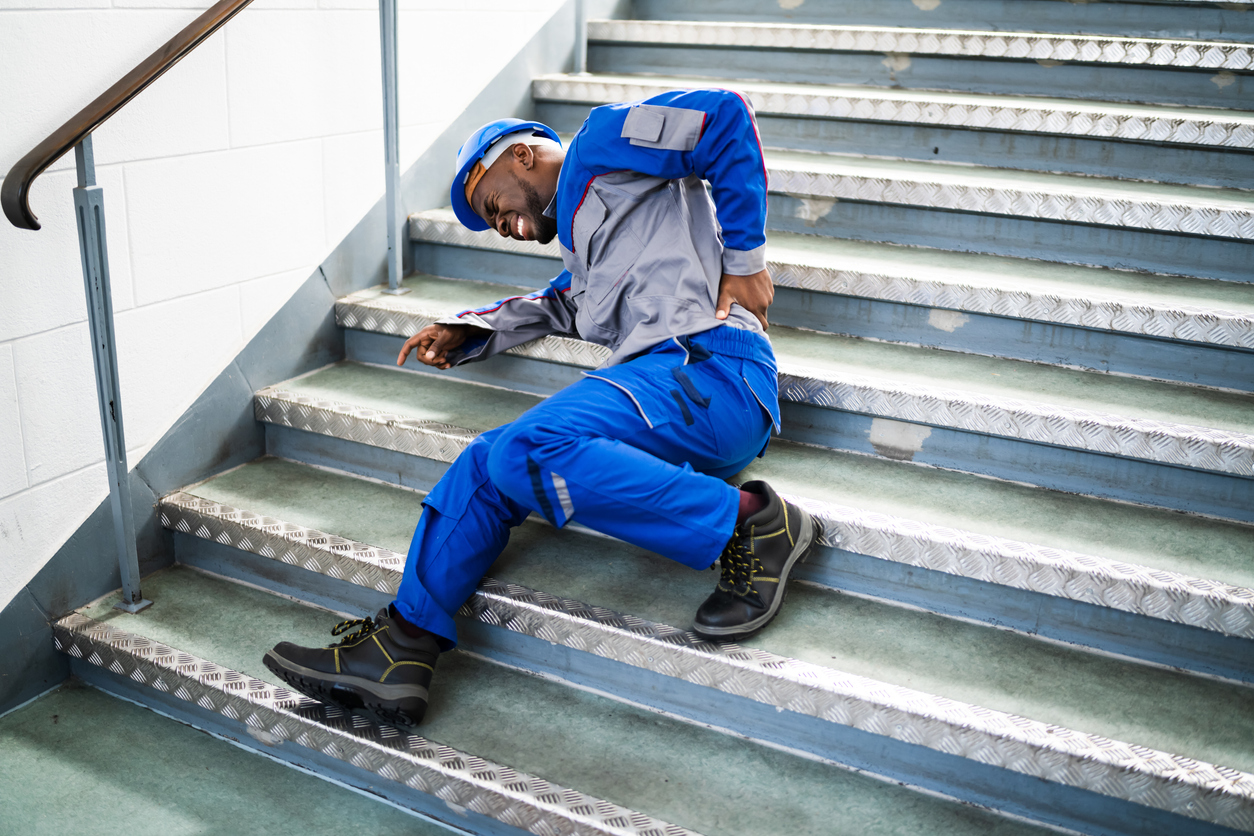Stephen Hasner | Slip and Fall | February 23, 2022

Falls are the most common cause of injuries in the U.S. Elevated falls and same-level falls send over 8 million people to the emergency room every year and account for approximately one-third of all emergency room visits.
Falls down stairs combine characteristics of both elevated falls and slip and fall accidents. In essence, falling down the stairs causes repeated impacts and injuries for the entire height of the fall.
Here are some of the injuries you can experience from a stair fall and information about the compensation you can recover.
Injuries from Falls Down Stairs
You can suffer almost any injury after a fall down a flight of stairs. The most severe injuries from falls include:
Fractured Bones
The repeated impacts with the stairs can fracture bones. Fractured bones generally require six to eight weeks to heal. But some fractured bones can cause serious complications.
A fractured vertebra can cause a spinal cord injury or death. A fractured skull can cause a traumatic brain injury or death, and a fractured rib can puncture an organ.
Spinal Cord Injuries
The spinal cord includes nerves that connect the brain to the body below the neck. A fall can injure the back or neck. A fractured vertebra or herniated disc can protrude into the spinal canal and sever or compress the spinal cord.
A spinal cord injury can cause:
- Pain
- Paralysis
- Numbness or tingling
- Loss of dexterity
- Muscle weakness
If the nerves get severed, you will suffer permanently. If the nerves get compressed, doctors can treat the injury by relieving the pressure on the nerves.
Traumatic Brain Injuries
You can injure your brain even if you do not hit your head when you fall. The whipping motion as you fall repeatedly can cause your brain to slosh in your skull. If your brain strikes the inside of your skull, your brain will bruise and you could suffer from a coma or death.
If your brain only sloshes in the cerebrospinal fluid, you could suffer a concussion. Symptoms of a concussion include:
- Headache
- Dizziness or nausea
- Confusion
- Blurry vision
- Ringing ears
- Drowsiness
- Amnesia
Concussion symptoms usually clear up within two months. If you still have concussion symptoms after two months, you may have post-concussion syndrome.
Proving Negligence for Falls Down Stairs
To recover compensation for a fall down stairs, you need to prove negligence by the owner or occupier of the premises. Negligence has four elements:
Duty of Care
The duty of care owed by an owner or occupier depends on why you were on the premises.
An invitee is someone who enters the premises with permission to economically benefit the owner, such as a customer in a store. Owners and occupiers owe the highest duty of care to people invited onto the premises. They must keep the property reasonably safe by fixing any known hazards, performing regular inspections, and warning invitees of any existing hazards.
A licensee is someone who enters the premises with permission for his own purpose, such as a social guest visiting a friend’s house. Owners owe a lower duty of care to licensees. They must warn licensees of nonobvious hazards, but they don’t have a duty to inspect the premises or repair known defects.
Owners owe the lowest duty of care to trespassers, or those who enter the premises without permission. Owners owe no duty to trespassers other than to avoid causing a willful or wanton injury. There is an exception for trespassing children who are lured by an “attractive nuisance” on the premises.
Breach of Duty
To prove breach of duty, you must show that the owner or occupier knew or should’ve known of a dangerous condition and failed to take reasonable measures to remedy the issue or warn of an existing hazard. Some examples of unsafe conditions include:
- Broken steps
- Torn or loose carpet
- Missing or broken handrails
- Slick stair surfaces
- Unmarked stairs
- Spills on the landing or steps
For example, if a store owner knew of a faulty step and failed to take reasonable measures to fix it or warn guests about the danger, a breach of duty occurred.
Causation and Damages
You must also prove two more things. The breach of duty must cause your injuries. You must have also suffered an injury or financial losses as a result of the accident.
Compensation for Falls Down Stairs
If you can prove all four elements of negligence, you can seek substantial compensation in a premises liability or personal injury lawsuit.
You may be entitled to economic damages, such as medical expenses and lost wages. Non-economic damages may also be available to cover your pain and suffering.
These awards can be substantial. To maximize your recovery, it is recommended that you speak with an experienced attorney.
Contact the Savannah Slip and Fall Lawyers at Hasner Law PC For Help
For more information, please contact the Savannah slip and fall law firm of Hasner Law P.C. at our nearest location to schedule a free consultation today.
We serve in Fulton County, Chatham County, and its surrounding areas:
Hasner Law PC – Atlanta Law Office
2839 Paces Ferry Rd SE #1050
Atlanta, GA 30339
(678) 888-4878
Hasner Law PC – Savannah Law Office
221 W York St
Savannah, GA 31401
(912) 234-2334


